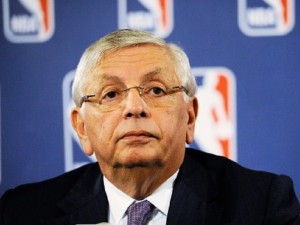
NBA Commissioner David Stern speaks at a press conference after NBA labor negotiations at The Westin Times Square on October 4, 2011 in New York City. Stern announced the NBA has canceled the remainder of the preseason and will cancel the first two weeks of the regular season if there is no labor agreement by Monday. AFP/Patrick McDermott/Getty Images
NEW YORK – Negotiations broke off between NBA players and club owners on Tuesday with all 114 pre-season games wiped out, no new talks planned and the threat of regular-season games to be lost on Monday.
Bargaining committees met for more than four hours in a failed last-ditch bid to solve a shutdown over financial issues that has lasted for 96 days, since owners locked out players after a prior deal ended July 1.
“By Monday we will have no choice but to cancel the first two weeks of the season,” NBA commissioner David Stern said. “We were not able to make the progress we would have liked to make.”
NBA owners had previously called off pre-season training camps and wiped out 43 pre-season games through October 15. With Tuesday bringing two more lost weeks of exhibitions, Stern estimated the NBA has already lost $200 million.
“We’re looking down the barrel of losing regular-season games,” Stern said. “There’s an extraordinary hit coming to the ownwers and the players.”
Billy Hunter, executive director of the NBA players association, said talks might not resume for a month or two. If true, it would likely mean no NBA games until next year at the earliest, he said.
“We have nothing scheduled [but] we have no foregone conclusions,” Stern said.
What will be gone by Monday, if Stern makes good on his threat and talks do not make a surprise resumption, are the first two weeks of the NBA season, the first games lost to a financial dispute since the 1998-99 NBA season.
Scheduled opening night games include Oklahoma City at the Lakers, Houston at Utah and Chicago at reigning NBA champion Dallas.
“Today was not the day for us to get this done,” NBA players union president Derek Fisher of the Los Angeles Lakers said.
Stern said talks collapsed after players showed no interest in a possible 50-50 split of basketball-related revenues. Players had received 57 percent of such income in the previous contract.
“We were advised by the players that that would not be acceptable to them,” Stern said. “At that point it did not seem to make a lot of sense to continue today by either side.”
Owners wanted a hard salary cap rather than the current exemption-filled system and a greater share of revenues from what last season was a $3.8 billion business.
They claim losses of $300 million last season, saying only eight of 30 teams made a profit.
Stern said owners backed off a firm salary cap but players have seen such moves as only finding a different way of imposing salary limitations.
Players said they offered to trim their share of basketball-related NBA income from 57 percent in the prior contract to 53 percent, which they said would amount to more than $1 billion over six years in the pockets of owners.
But team owners were wanting 47 percent of such funds and when the players nixed any talk of a 50-50 split – something the ownership negotiators had not even sold all of their club owners upon – it set the stage for talks to end.
“We were making good progress with our owners on that point (a 50-50 split) but it was interrupted by the players saying no,” Stern said.
Stern said he offered the players an opt-out clause after seven years of a proposed 10-year deal.
With little hope of making up lost games after the scheduled end of the six-month season in April, only days remain before the NBA shortens a season due to financial issues for only the second time in history.
NBA teams each played only 50 games in a truncated 1998-1999 campaign after more than two months were lost to bickering over money.

